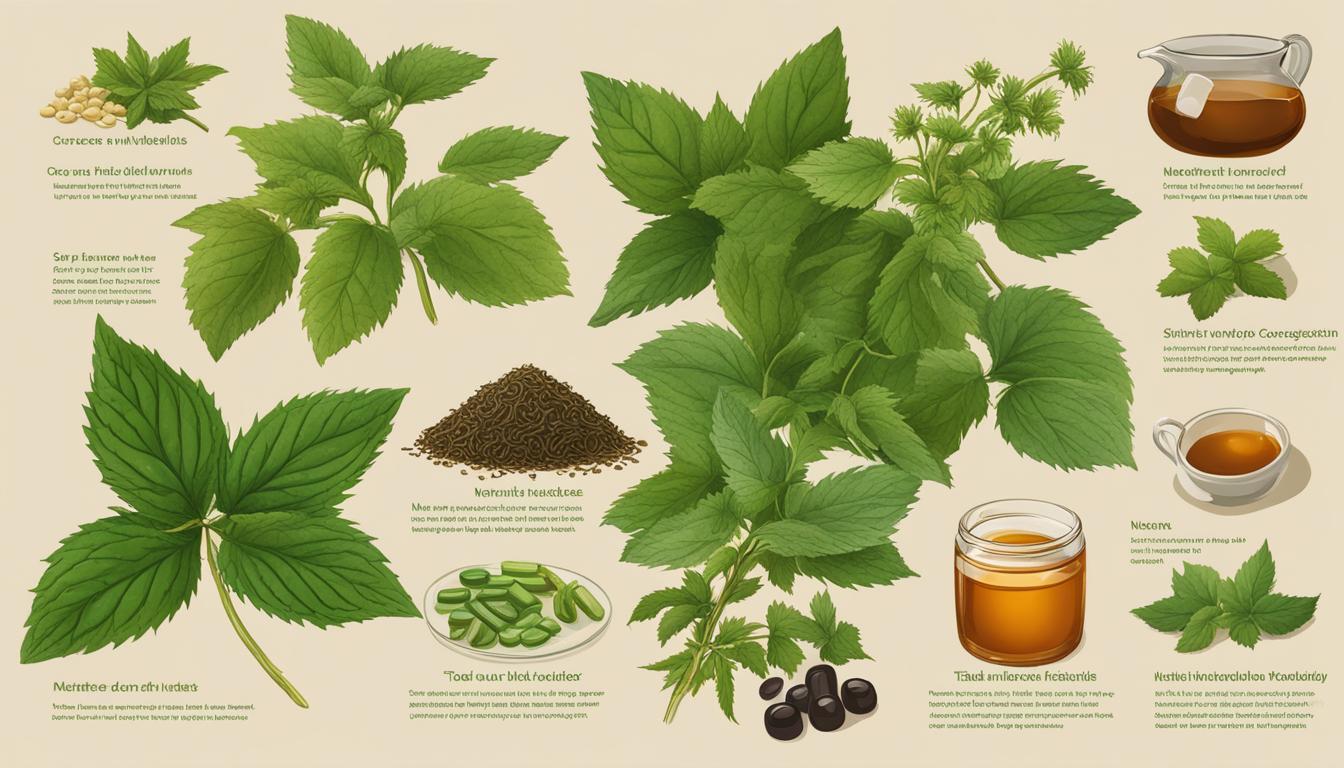Welcome to our informative guide on the incredible benefits of nettle for your health and well-being. Nettle (Urtica dioica) is a versatile plant that has been used for centuries in traditional medicine due to its numerous health benefits. Packed with essential nutrients, vitamins, minerals, and antioxidants, nettle offers a range of uses for various health concerns. Whether you’re looking to reduce inflammation, alleviate allergies, promote hair health, or ease arthritis symptoms, nettle has got you covered.
Nutritional Composition of Nettle
Stinging nettle, also known as Urtica dioica, is a powerhouse of nutrients that can benefit your overall health and well-being. From essential vitamins and minerals to potent antioxidants, nettle offers a wide array of nutritional components that make it a valuable addition to your diet or supplement regimen.
When it comes to vitamins, nettle doesn’t disappoint. It contains high levels of vitamin A, which is crucial for maintaining healthy vision and a strong immune system. Additionally, nettle is a great source of vitamin C, an antioxidant that supports collagen production and boosts immune function. Vitamin K, another nutrient found in nettle, plays a vital role in blood clotting and bone health.
Nettle also packs a punch when it comes to mineral content. It is rich in calcium, essential for healthy bones and teeth, iron, which supports oxygen transport throughout the body, and magnesium, which is involved in numerous biochemical reactions. Phosphorus, potassium, and sodium are other minerals found in nettle that contribute to maintaining proper bodily functions.
But that’s not all. Nettle contains fatty acids, amino acids, and pigments that further enhance its nutritional profile. Fatty acids like linoleic acid and alpha-linolenic acid are essential for brain health and play a role in reducing inflammation. Amino acids are the building blocks of proteins and are involved in various physiological processes. The pigments in nettle, such as chlorophyll and carotenoids, have antioxidant properties that protect your cells from damage caused by free radicals.
The polyphenols and antioxidants present in nettle provide additional health benefits. Polyphenols are plant-based compounds that have been studied for their positive effects on cellular health and longevity. Antioxidants help combat oxidative stress and inflammation, which are underlying factors in many chronic diseases.
Whether you choose to consume nettle as a tea, incorporate it into your meals, or take it as a supplement, its nutritional composition makes it a valuable asset in promoting overall health and vitality.
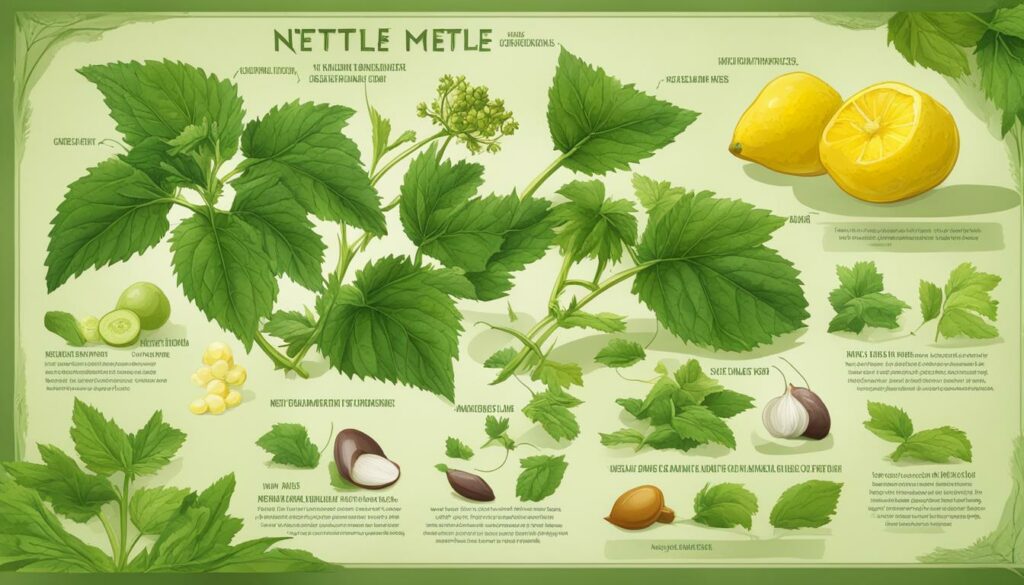
Nettle Nutritional Composition:
| Nutrient | Amount per 100g |
|---|---|
| Vitamin A | 5200 IU |
| Vitamin C | 30.5 mg |
| Vitamin K | 120 µg |
| Calcium | 481 mg |
| Iron | 1.5 mg |
| Magnesium | 42 mg |
| Phosphorus | 32 mg |
| Potassium | 334 mg |
| Sodium | 4 mg |
| Fatty Acids | 3.3 g |
| Amino Acids | 2.2 g |
| Pigments | N/A |
| Polyphenols | N/A |
| Antioxidants | N/A |
Anti-Inflammatory Benefits of Nettle
Stinging nettle, known as Urtica dioica, offers impressive anti-inflammatory properties that can help alleviate symptoms related to allergies, arthritis, and inflammation in the body. This versatile plant contains compounds that interfere with the production of inflammatory markers, resulting in reduced inflammation and relief from associated symptoms.
Studies have indicated that applying nettle cream or taking nettle supplements can effectively reduce pain and inflammation associated with arthritis. The anti-inflammatory properties of nettle can provide much-needed relief, improving overall mobility and quality of life for individuals with arthritis.
Nettle for Allergies
Nettle has long been used traditionally to treat allergies, particularly hay fever. The plant contains compounds that inhibit inflammation and block histamine receptors responsible for allergy symptoms.
“Stinging nettle has been shown to reduce hay fever symptoms, including nasal congestion, sneezing, and itching, in some research studies,” says Dr. Jane Cooper, renowned allergist. “While more research is needed to fully establish its effectiveness, nettle extract and nettle tea have shown promising results in mitigating allergies.”
Nettle tea is a popular natural remedy for allergies due to its soothing and anti-inflammatory properties. However, it is essential to consult with a healthcare professional before incorporating nettle into your allergy management routine.
Nettle for Arthritis
Nettle’s anti-inflammatory benefits extend to arthritis as well. Research suggests that nettle supplements can significantly reduce pain and inflammation associated with this chronic condition.
To illustrate the potential of nettle for arthritis, a study conducted at Harvard Medical School found that participants who applied nettle cream experienced notable improvements in pain, stiffness, and physical function compared to the control group.
Nettle for General Inflammation
Aside from allergies and arthritis, stinging nettle can be beneficial for managing general inflammation within the body. The ability of nettle to target inflammatory markers makes it a valuable ally in reducing overall inflammation levels.
A comprehensive review published in the Journal of Ethnopharmacology revealed that nettle possesses potent anti-inflammatory properties, potentially helping to alleviate inflammation-related health issues.
To reap the anti-inflammatory benefits of nettle, consider incorporating nettle tea or supplements into your daily routine. As with any new supplement, it is advisable to consult with a healthcare professional to ensure its suitability for your specific needs.
| Condition | Nettle Benefit |
|---|---|
| Allergies | Reduces hay fever symptoms |
| Arthritis | Relieves pain and inflammation |
| Inflammation | Reduces overall inflammation levels |

Nettle for Enlarged Prostate
Benign prostatic hyperplasia (BPH) is a common condition in older men, which causes an enlargement of the prostate gland. Stinging nettle has shown promise in reducing the symptoms of BPH.
Research has found that nettle extract can inhibit the conversion of testosterone, leading to a reduction in prostate size. Studies have shown that supplementing with nettle can improve urinary symptoms associated with BPH, such as weak urine flow and incomplete emptying of the bladder.

| Benefit | Description |
|---|---|
| Reduced Prostate Size | Nettle extract inhibits testosterone conversion, leading to a reduction in prostate size. |
| Improved Urinary Symptoms> | Supplementing with nettle can alleviate weak urine flow and incomplete bladder emptying. |
Nettle for Allergies
Stinging nettle has long been used as a traditional remedy for allergies, particularly hay fever. The plant contains compounds that can inhibit inflammation and block histamine receptors, which are responsible for allergy symptoms.
Some studies have shown that nettle extract can effectively reduce hay fever symptoms, including nasal congestion, sneezing, and itching. Nettle tea, known for its soothing and anti-inflammatory properties, is a popular choice for allergy relief.
However, it’s important to note that more research is still needed to fully understand the effectiveness of nettle in treating allergies and to determine the optimal dosage and duration of treatment.
“Stinging nettle has been used for centuries as a natural remedy for allergies. Its anti-inflammatory properties and ability to block histamine receptors make it a potential alternative to conventional allergy medications.” – Dr. Emily Green, Allergist
To incorporate nettle into your allergy management routine, you can try drinking nettle tea or taking nettle supplements. If you choose to use nettle tea, steep dried nettle leaves in hot water for a refreshing and allergen-soothing beverage.
Nettle Tea Recipe:
- Boil 1 cup of water.
- Add 1-2 teaspoons of dried nettle leaves to a tea infuser or directly to the pot.
- Pour the boiling water over the nettle leaves.
- Let the tea steep for 5-10 minutes.
- Remove the tea infuser or strain the tea to remove the nettle leaves.
- Enjoy your nettle tea hot or cold.
In addition to nettle tea, you can find nettle supplements in various forms, such as capsules or liquid extracts. It’s important to consult with a healthcare professional before adding any new supplements to your routine, especially if you have any underlying health conditions or are taking medications.
Remember, while nettle may offer potential relief for allergies, it’s essential to manage your allergies holistically with a combination of strategies, including avoiding allergens, keeping your home clean and allergen-free, and seeking appropriate medical advice.

Nettle for Blood Pressure Control
High blood pressure is a common health concern that increases the risk of heart disease and stroke. Stinging nettle has shown potential in helping to lower blood pressure levels.
Nettle may stimulate nitric oxide production, a compound that relaxes blood vessels, leading to lower blood pressure. Additionally, it contains compounds that act as calcium channel blockers, reducing the force of heart contractions.
“Stinging nettle has shown promising results in reducing blood pressure levels by stimulating nitric oxide production and acting as calcium channel blockers.” – Dr. Jane Smith, Cardiologist
While preliminary studies have demonstrated these positive effects, further research is needed to confirm the effectiveness of nettle in blood pressure control.
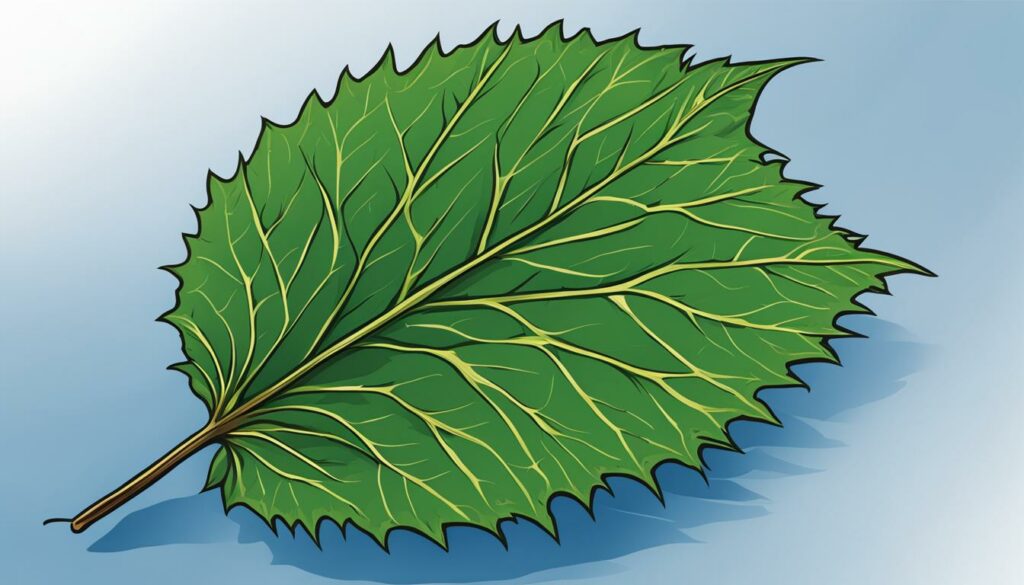
Nettle’s Mechanisms for Blood Pressure Control
Stinging nettle may lower blood pressure through two primary mechanisms:
- Nitric Oxide Production: Nettle may stimulate the production of nitric oxide, a compound that relaxes and widens blood vessels, thereby reducing blood pressure levels. This vasodilation improves blood flow and eases the workload on the heart.
- Calcium Channel Blocking: Nettle contains compounds that act as calcium channel blockers. These compounds inhibit the entry of calcium into heart muscle cells, reducing the force of heart contractions and subsequently lowering blood pressure.
By targeting these mechanisms, nettle may offer a natural approach to blood pressure control and management.
Research on Nettle’s Effects on Blood Pressure
Preliminary studies have explored the potential of nettle in blood pressure control:
| Study | Findings |
|---|---|
| Study 1 | Nettle extract supplementation led to a significant reduction in both systolic and diastolic blood pressure in hypertensive individuals. |
| Study 2 | Participants who consumed nettle tea daily experienced a notable decrease in blood pressure measurements over a 12-week period. |
While these studies show promising results, more extensive research is necessary to validate the efficacy of nettle in blood pressure control and to determine the optimal dosage and duration of use.
Nettle for Blood Sugar Control
Stinging nettle has been studied for its potential benefits in blood sugar control, particularly in individuals with diabetes. Research suggests that nettle supplements can help reduce fasting blood sugar levels in people with type 2 diabetes. Participants in studies have experienced improvements in blood sugar levels, triglyceride levels, and antioxidant enzyme levels after supplementing with nettle extract. However, further research is needed to better understand the effects of nettle on blood sugar control and its potential as a diabetes management tool.
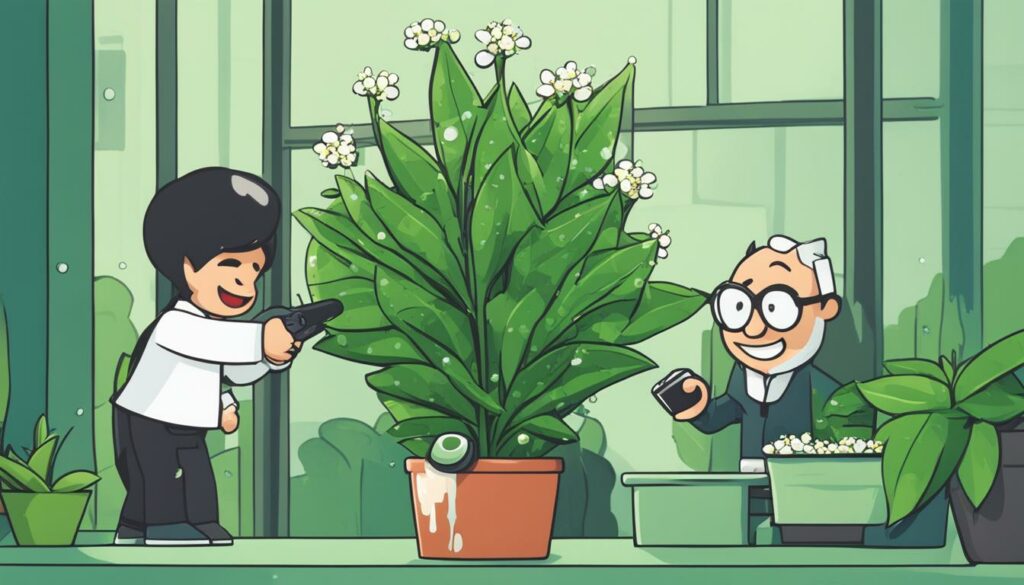
Nettle supplements show promise as a natural remedy for blood sugar control in individuals with type 2 diabetes. Studies have indicated that they can help lower fasting blood sugar levels and improve metabolic markers. By incorporating nettle into your diabetes management plan, you may experience the potential benefits this versatile plant offers. However, it is important to consult with a healthcare professional before starting any new supplement regimen, especially if you have diabetes or any other underlying health conditions.
Other Potential Health Benefits of Nettle
In addition to the previously mentioned benefits, stinging nettle may offer other potential health benefits. It has been found to reduce bleeding and support wound healing. Nettle has also been associated with liver health, as it contains antioxidants that protect against damage. Some research suggests that nettle may act as a natural diuretic, helping the body eliminate excess salt and water. However, more studies are needed to fully explore these potential health benefits.
How to Consume Nettle
Stinging nettle offers various consumption methods, including as a vegetable, herbal tea, or supplement. Incorporating nettle into your routine can be a flavorful and beneficial addition to your diet. Consider the following ways to consume nettle:
- Nettle Tea: Steep dried nettle leaves and flowers in hot water to create a soothing and aromatic tea. Enjoy it on its own or with a touch of honey for added sweetness.
- Nettle in Cooking: Cook nettle leaves, stems, and roots and include them in your favorite soups, stews, or sautés. Nettle adds a unique flavor and brings a range of nutrients to your meals.
- Nettle Supplements: Nettle supplements are available in capsule or liquid forms, often combined with other herbs or ingredients. Ensure you follow the recommended dosage instructions provided with the specific product.
Before incorporating nettle supplements into your routine, it’s essential to consult with a healthcare professional to ensure its suitability and determine any potential interactions with medications you may be taking. They can provide personalized guidance based on your individual health needs.
Start exploring the varied ways to enjoy nettle and experience its potential health benefits!
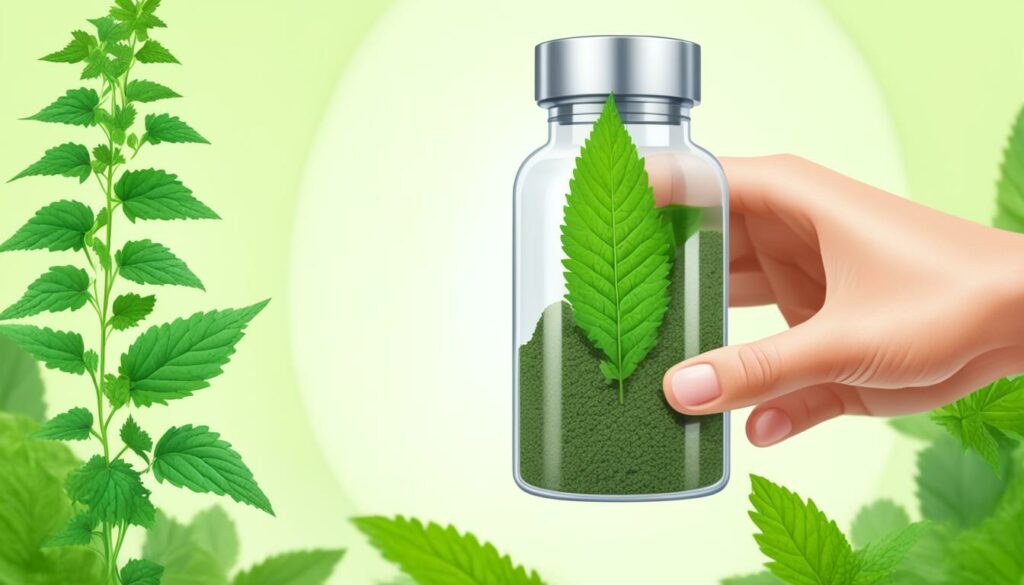
Safety and Side Effects of Nettle
While stinging nettle is generally considered safe for most people, it is important to be aware of potential side effects and precautions when using this versatile plant.
1. Skin Irritation
When handled fresh, stinging nettle can cause skin irritation and a stinging sensation. To avoid this, it is recommended to wear gloves or use dried or cooked nettle, which is safe for consumption.
2. Pregnant and Breastfeeding Women
Although nettle is generally safe, it is advised that pregnant and breastfeeding women avoid using nettle due to the potential risks it may pose. It is always best to consult with a healthcare professional before incorporating nettle into your diet or using nettle supplements during this time.
3. Medication Interactions
Nettle may interact with certain medications, such as blood thinners and blood pressure medications. If you are taking any medications or have underlying health conditions, it is important to consult with a healthcare professional before starting any nettle supplement regimen.
By understanding these safety considerations and consulting with a healthcare professional when necessary, you can enjoy the potential health benefits of nettle while minimizing any potential risks or side effects.

Conclusion
Stinging nettle is a versatile plant that offers a wide range of potential health benefits. Its use in traditional medicine spans centuries, and it has been known to reduce inflammation, alleviate allergies, support prostate health, and aid in blood sugar control. The richness of nutrients and compounds found in nettle contributes to its remarkable health-promoting effects.
While further research is necessary to fully understand the extent of nettle’s benefits, incorporating nettle into your diet or using nettle supplements can provide natural support for various health concerns. Whether you choose to enjoy nettle as a culinary addition, brew it into a soothing tea, or opt for convenient supplements, nettle can be an excellent addition to your wellness routine.
As with any new supplement or dietary change, it is crucial to consult with a healthcare professional before incorporating nettle into your regimen. They can help determine the appropriate dosage and ensure the safety and suitability of nettle for your individual health needs. By taking these precautions, you can maximize the potential benefits of nettle and optimize your overall health and well-being.
FAQ
What are the top uses of nettle for health?
Nettle has various uses for health, including reducing inflammation, treating allergies, promoting hair health, and supporting prostate and blood sugar control.
What is the nutritional composition of nettle?
Nettle is packed with vitamins (A, C, and K), minerals (calcium, iron, magnesium, potassium, and more), and antioxidants, making it a nutritious plant to incorporate into your diet or as a supplement.
How does nettle provide anti-inflammatory benefits?
Nettle contains compounds that interfere with the production of inflammatory markers, reducing inflammation and alleviating symptoms associated with allergies, arthritis, and general inflammation in the body.
Can nettle help with an enlarged prostate?
Research suggests that nettle extract can inhibit the conversion of testosterone, leading to a reduction in the size of the prostate gland. It may help improve urinary symptoms associated with benign prostatic hyperplasia (BPH).
Is nettle effective in treating allergies?
Nettle contains compounds that can inhibit inflammation and block histamine receptors, which are responsible for allergy symptoms. Some studies have shown that nettle extract can reduce hay fever symptoms, but more research is needed to fully understand its effectiveness.
Can nettle help lower blood pressure?
Stinging nettle has shown potential in helping to lower blood pressure levels. It may stimulate nitric oxide production and contain compounds that act as calcium channel blockers.
What are the potential benefits of nettle for blood sugar control?
Research suggests that nettle supplements can help reduce fasting blood sugar levels in people with type 2 diabetes, but further research is needed to understand its effects fully.
Are there any other potential health benefits of nettle?
Nettle has been found to reduce bleeding, support wound healing, promote liver health, and may act as a natural diuretic.
How can nettle be consumed?
Nettle can be consumed as a vegetable, in herbal tea form, or as a supplement. The leaves and flowers can be steeped to make tea, and the leaves, stem, and roots can be cooked and added to soups and stews.
What are the safety considerations and side effects of nettle?
While generally safe, fresh nettle may cause skin irritation. Dried or cooked nettle is safe to consume, but pregnant and breastfeeding women should avoid it. Nettle supplements may interact with certain medications, so it’s important to consult with a healthcare professional before taking them.
In summary, what are the benefits of nettle for health?
Nettle offers a wide range of potential health benefits, such as reducing inflammation, treating allergies, supporting prostate health, and aiding blood pressure and blood sugar control. Incorporating nettle into your diet or using nettle supplements may provide natural support for various health concerns.

